- Know about the
Sangameshwara Temple and Papanasi cluster of temples in Alampur, Telangana.
Alampur is a town
in Telangana state of India that has historical and spiritual importance. It was
previously in the Mahbubnagar district of Andhra Pradesh and became part of the
Gadwal district of Telangana post the bifurcation of the state of Andhra
Pradesh. It is on the bank of the River Tungabhadra.
It is primarily a
Shaivite pilgrim center with Shaktism also worshipped. Historically, Alampur
was under the rule of Shatavahana Ishvakus of Nagarjunakonda, Badami Chalukyas,
Rashtrakutas, Kalyani Chalukyas, Kakatiyas, Vijayanagara Empire and Qutb Shahis
of Golconda.
Alampur is well
known for the Jogulamba Temple. Surrounding the Jogulamba temple are the
beautiful Nava Brahma temples. What many people who go there do not know, is
that there are two more fantastic temples that are only a five-minute drive
from Jogulamba temple. This article is about those two temples.
To read part 1 on Jogulamba
and Nava Brahma Temples of Alampur
Sangameshwara
Temple
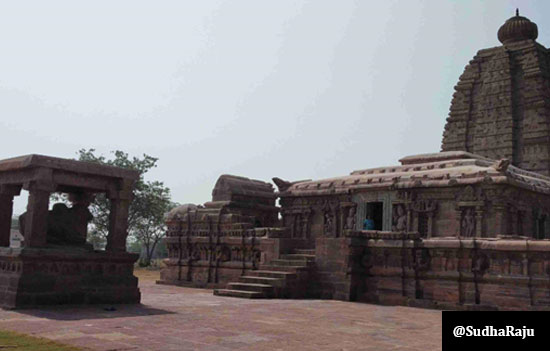 Nandi in a mandapam opposite the steps to the temple.
Nandi in a mandapam opposite the steps to the temple.
The Sangameshwara
temple was first located at the Sangam of Krishna and Tungabhadra rivers at a
village called Kudavalli, 16 km from Alampur.
Though the board
mentions that it was built during the time of Vikramaditya I (655-81CE), it is
believed to have been built by Pulikeshin. Due to the Srisailam hydro power
project, the temple was at risk of submerging, so it has been relocated to the
outskirts of Alampur by the Archaeological Survey of India (ASI).
ASI did a
fantastic job of replanting the temple, without disturbing the architecture.
They took pictures, removed the stones layer by layer and rebuilt it. The
interior has twelve carved pillars in and space around the garbagriha for a pradakshina.
It has flow of air and light through the latticed windows of the stone walls.
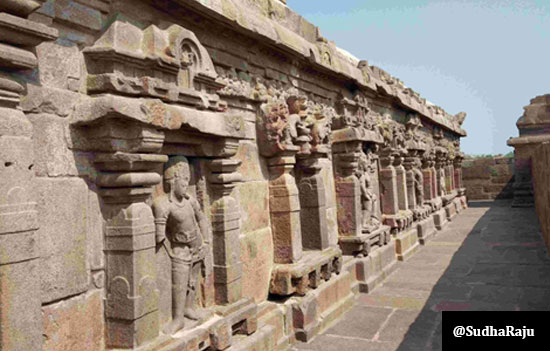 All around the temple, the walls have alcoves filled with sculpture.
All around the temple, the walls have alcoves filled with sculpture.
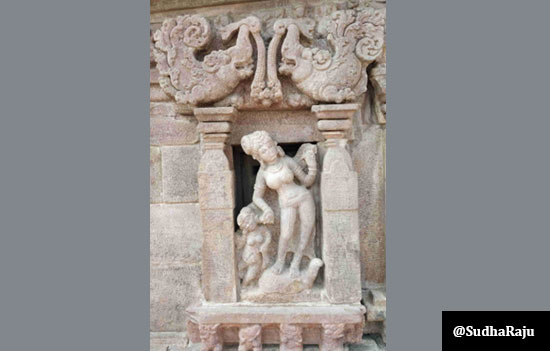 Yamuna standing on her vehicle, the turtle. Makaras carved above.
Yamuna standing on her vehicle, the turtle. Makaras carved above.
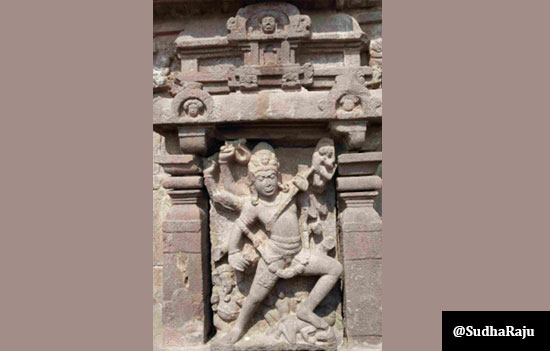 Mahadev slaying
asuras. Ganesha beside him.
Mahadev slaying
asuras. Ganesha beside him.
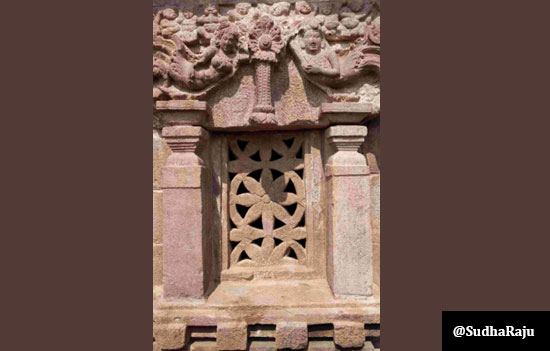 Though this window design looks like a flower, it is a matsya yantra, 8 fish converged together. Kinnaras above the window.
Though this window design looks like a flower, it is a matsya yantra, 8 fish converged together. Kinnaras above the window.
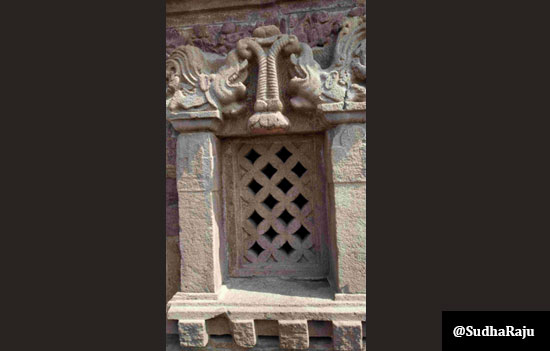 Windows with makaras above.
Windows with makaras above.
All the stone
windows have different designs. These latticed windows made enough light and
air to pass through to the interior.
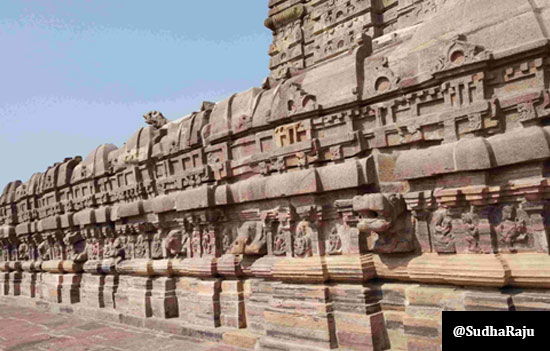
The temple is on
an elevated platform which is richly sculpted all around. The pujari who does
the worship of Deva is the descendant of the family of archakas who have been attached to the temple for the past many
centuries. They have shifted to Alampur, along with the temple from Kudavalli. The
architecture of this temple is similar to the temples of Pattadakal
and Aihole
which also showcase the splendor of the Badami Chalukyas.
Papanasi
cluster of temples
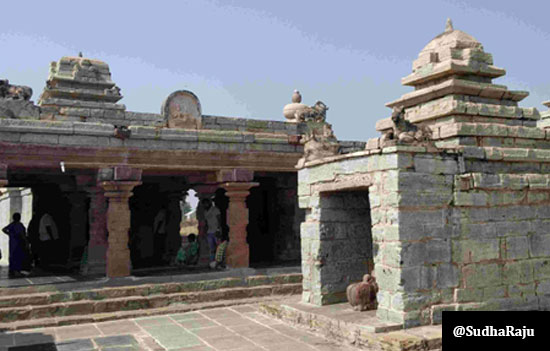
From the
Sangameshwara temple, we went to the Papanasi Temple, which is a cluster of 23
temples. The Papanasi Temples were also relocated to avoid damage by the
Srisailam hydro power project.
These temples were
built between 7th & 11th century CE. Some started at the time of early
Chalukyas but completed during the time of Rashtrakutas and later Chalukyas.
The site has two main temples with carved pillars, the rest are small temples.
The largest temple
is the Papanaseshwara temple. It consists of a pillared mandapa, antarala and
garbagriha. The Shiva linga of Papanaseshwara is a 1400 years old markata lingam.
It is greenish in colour and shining. After entering the temple, we sat down to
hear the sthala puranam from the Panditji. And casually looked up and saw
Nataraja with the Asta Dikpalas on the ceiling.
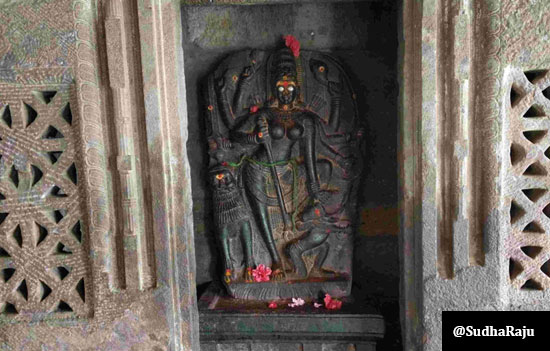 Mahishasuramardini
Mahishasuramardini
To one side we
have Mahishasura mardini in the temple with latticed windows and another side
we have Vidya Ganapati and Saptamatrikas.
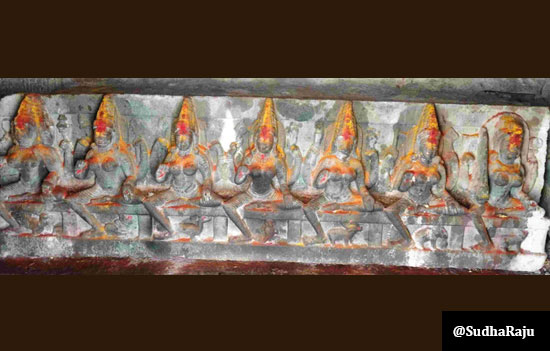 The Saptamatrikas Brahmani, Vaishnavi, Maheshwari, Indrani, Kaumari, Varahi & Chamundi are the 7 Mother Goddesses.
The Saptamatrikas Brahmani, Vaishnavi, Maheshwari, Indrani, Kaumari, Varahi & Chamundi are the 7 Mother Goddesses.
The temple on the
left of the main temple is called Gurulingeshwara. This temple also has a
sculpted pillared mandapam and a garbagriha.
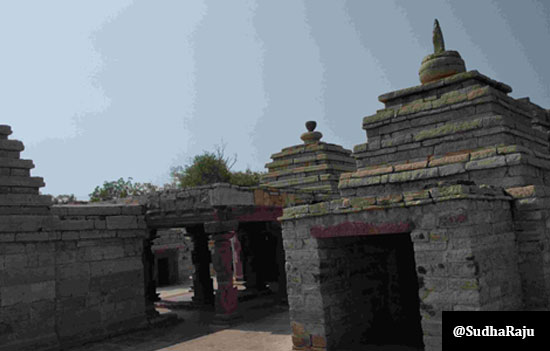
The garbagriha is
of the same type of reddish stone as the main temple. The Mandapam and pillars
have blackish stone and the carvings on these pillars are better preserved. The
pillars are beautifully carved with depictions of Samudra manthan, Shiv Parvati
kalyanam, Trivikrama and the Ramayana.
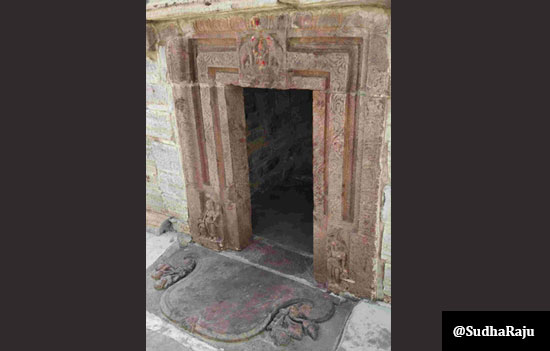 This is an entrance to a smaller temple, with Gajalakshmi on the doorway and I think Ganga and Yamuna below.
This is an entrance to a smaller temple, with Gajalakshmi on the doorway and I think Ganga and Yamuna below.
After doing pranam
in all the small temples, we finished the Papanasi Temples visit.
For lunch we
stopped at AP tourism, Haritha Hotel which is nearby. If we have a Haritha
Hotel or Resort in any tourist destination, we can be assured of decent
washrooms, which is an issue during travel in India, especially for women. Sadly
there was nothing much to eat.
Though we went to
Alampur during December ending, it was pretty hot over there, which we did not
expect.
Thus, ended my
Alampur visit.
I am blessed to
have seen these wonderful temples. Anybody going to Alampur must not miss
visiting these beautiful temples.
Author Sudha Raju is a teacher by profession, freelance writer
and Author of book Ancient Temples My Travelogue. She is a seeker of knowledge
and believes that there is much to learn from our ancient heritage and temples.
She utilises her free time travelling to ancient temples and learning more
about them.
To read all
articles Temples of India And To see all abums